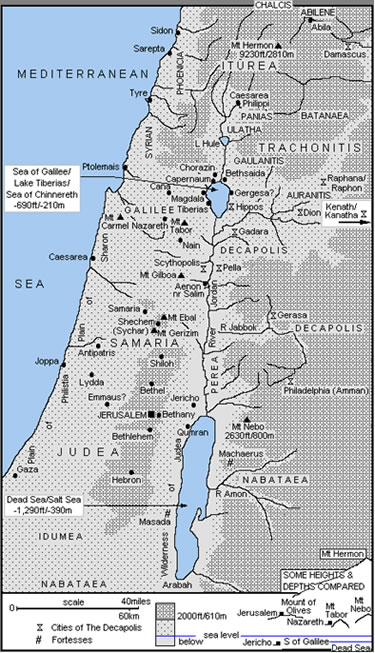John 4:1-29
In chapter 3 Jesus was in
Now, in chapter 4 Jesus is in
Where Nicodemus had everything going for him: Jewish, Male, Teacher, Sanhedrin
The Samaritan woman had everything going against her: Samaritan, Female, divorced, living with a man.
Jesus told Nicodemus he must be completely born again to see
the
Jesus told the Samaritan woman that He was the gift from God.
4:3
John calls Jesus “Lord” for the first time. It has been established in the first three chapters that this is a fact. John now assigns the title “Lord” to Jesus since he has proven it to be the case.
4:4
“had to” may refer to:
a)
the most direct and popular route from
b)
divine leading led Jesus through
Samari
a)
King Omri purchased this hill and built the city of
b)
The name
c)
In 722 the northern kingdom of
d) The northern Israelites intermarried with the Gentiles. The culture and religions drifted further from Jewish culture, though some similarities remained
e)
The Jews from the south (Judea) returned from
Babylonian captivity beginning in 538 BC considered the people of
f)
Nehemiah’s people rejected the Samaritans and
their help in building the walls of
g)
The Samaritans built their own temple on
h)
The Jews from
i) In Jesus day the Samaritans continued to worship on Mr. Gerazim.
j) The Samaritans only accept the first five books of the Bible (the Pentateuch)
k) The Samaritan religion continues yet today with animal sacrifices and members who traced their lineage back to these ancient times.
l) According to Josephus the Samaritans traced their lineage from Jacob through Joseph.
4:6
Sixth hour is noon.
4:7
An orthodox Jewish man would not talk to a woman especially a Samaritan woman nor would he have bought Samaritan food.
Jesus appears to disregard ceremonial regulations often.
4:9
Jews prayed that no Samaritans would be resurrected.
When the religious enemies of Jesus called him names they used the term “Samaritan” (John 8:48)
The woman appears to insult Jesus but he ignores this just like he ignored Nicodemus’ compliment. Jesus goes straight to the topic.
4:10
“living water” refers to:
a) a moving water like a river
b) life giving Spirit of God
See Isaiah 55:1
4:11
The woman acts as if she knew what “living water” was.
4:12
This well is still there today. It is 75 feet deep and can be drank from today.
The woman claims Jacob as the father of the Samaritans, which would be an insult to a Jew.
4:13
OT references to water as the Spirit and Eternal Life
Isaiah 12:3; 44:3; 49:10; 55:1—7
Jeremiah 31:29-34
Ezekiel 36:25-27
Joel 2:28-32
4:16
Jesus asks for her husband to make this socially acceptable
4:17
The woman didn’t want to wait and said she was not married.
4:18
Jesus then supernaturally tells her information he normally would not have known and shocks the woman
By doing this Jesus reveals himself to her.
Jesus revealed himself to Nicodemus by appealing to Nicodemus’ understanding of OT scripture.
Jesus reveals himself to the Samaritan woman by amazing her with supernatural knowledge and showing her he was more than a man.
Jesus recognizes twice that she has told the truth.
4:19
The woman recognizes that Jesus was something special
4:20
The woman diverts the conversation away from herself and onto a theological issue.
The Samaritans chose
a)
Deut. 11:29-30; 27:2-7, 12 God tells the
Israelites to worship Him on
b) God revealed himself to Abraham here and Abraham built an altar in Genesis 12:6-7
c) Jacob lived here when he returned from Paddan-aram in Gen. 33:18-20; 35:5
d) The Samaritans added to the scriptures by saying:
a. Abraham offered Isaac here
b. Abraham met Melchizedek here
4:21
Jesus spoke of a day when the where of worship would not matter
4:22
“you” is plural meaning “you Samaritans”
They did not know God nor did they know what they worshipped because:
1) They had rejected the majority of God’s revelation of himself
2) They will influenced by pagan religions
3) Their worship was false so it involved demon worship but they called it God.
4:23
The Greek says:
pneuma o A SPIRIT
qeoV GOD
kai AND touV THEY THAT proskunountaV WORSHIP auton HIM en IN pneumati
SPIRIT kai
AND alhqeia TRUTH
dei
MUST proskunein WORSHIP
This
is called a hendiadys with one preposition (en or in)
that speaks to both nouns (pneumati SPIRIT and alhqeia TRUTH) that are connected by a
conjunction (kai
or and). This would be read as “truly
spiritual worship” and not as two nouns describing worship as “true” and “spiritual”.
4:25
The
Samaritans where waiting for the Messiah.
Their
understanding of the Messiah was based on Deut. 18:15-19 and they saw him
mainly as a teacher.
4:26
Jesus
does something that he does not do for the Jews until his arrests and
trials.
He
tells the woman that he is the Messiah.
The
Jews were looking for a military leader and for Jesus to say he was the Messiah
would have put visions of a Roman overthrow into their minds.
4:29
The
woman presents here discovery as a question that needs to be investigated by
others instead of a dogmatic statement.
